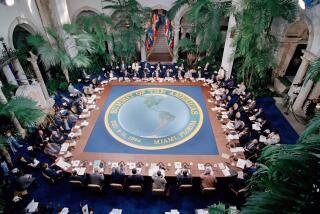APEC Leaders Endorse Talks in 2001
- Share via
BANDAR SERI BEGAWAN, Brunei — Leaders from the Asia-Pacific region set aside their bitter differences over the impact of more open world trade Thursday and unanimously endorsed a call to launch a new round of global negotiations next year.
The ability of the leaders of the 21-member Asia-Pacific Economic Cooperation forum, known as APEC, to endorse the 2001 date for a new trade round helped rescue a two-day summit that had seemed headed for a very public and embarrassing failure.
The agreement is a small step. It does not guarantee the start of a new round, and it made only the vaguest reference to a possible agenda for negotiations--an issue that looms as the next battleground between the rich industrialized and poorer developing nations.
However, it does constitute a badly needed victory for proponents of greater trade liberalization, who have been on the defensive for most of the last year since a World Trade Organization meeting collapsed in shambles in Seattle amid violent anti-trade protests and disenchantment among poorer nations. The fact that it was unexpected made the achievement of the agreement all the sweeter for supporters.
“It’s a clear expression of political will on the part of leaders from these countries in the wake of Seattle,” said Gene Sperling, director of President Clinton’s National Economic Council. “The fact that the date 2001 became a test of political will and the leaders rose to it is a positive sign.”
Only a day earlier, Clinton had told fellow leaders that launching a new trade round “as early as possible next year” was “the most important thing we can do.”
In Geneva, WTO spokesman Keith Rockwell called the APEC declaration “very welcome,” but he noted that dozens of other nations also need to endorse the move. Although the European Union and large countries such as Brazil and India have supported a new round of trade negotiations next year, their views on how ambitious the agenda should be are said to vary greatly.
In pre-summit meetings here, a group of mainly Southeast Asian countries, led by Malaysia, had forced removal of the date from the draft declaration. They complained that an agenda had been established first.
Their stance stemmed from a growing disenchantment with the impact of liberalized world trade on less-developed economies. They have watched the disparity between rich and poor nations widen over the last decade, and have seen similar divisions within their own societies as globalization arguably has favors the affluent and well-educated.
But as the dispute gradually became a central focus of the summit and a symbol of APEC’s collective ability to push ahead with its long-term goals of free trade among its 21 members, support for a new global trade round next year, led by such nations as Japan and Singapore, carried the day.
In return for endorsing a global trade round next year, developing nations won a pledge for a “sufficiently broad-based agenda that responds to the interests and concerns of all WTO members.”
Developing nations are expected to oppose efforts by industrialized nations, including the United States, to make issues such as worker rights and environmental standards part of a global trade agenda.
APEC’s final declaration also was heavy with conciliatory language toward developing economies, including calls to close the so-called digital divide by tripling the number of people with computer access in the Pacific Rim region by 2005 and strengthening educational systems.
“We can’t have a world where some race along the information superhighway while others struggle against disease, famine and poverty,” said the summit’s host, Sultan Sir Hassanal Bolkiah of Brunei.
However, in a region of enormous disparities in technological development, even narrowing the opportunity gap will not be easy. In Indonesia, for example, only 3% of the population has telephone connections and 2% has computer access. This contrasts with South Korea, where more than 70% of the population is said to have Internet access.
More to Read
Sign up for Essential California
The most important California stories and recommendations in your inbox every morning.
You may occasionally receive promotional content from the Los Angeles Times.













